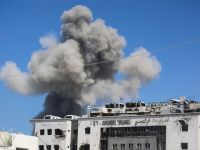The failure of the Middle East peace talks at Camp David in late July is responsible for the recent surge in crude oil prices, according to analysts cited in Friday's Wall Street Journal Europe.
Saudi Arabia -- traditionally the Organisation of Petroleum Exporting Countries' (OPEC) leading dove, favouring more moderate prices -- indicated its commitment to prices of between 20 and 25 dollars a barrel, following the last OPEC meeting in June, the newspaper noted.
As the world's leading oil producer, the newspaper argued the nation could have ensured enough oil to make that happen.
The fact that prices are well over 30 dollars a barrel in London and New York, it said, is because Saudi Arabia is refusing to pump more crude in order to signal its "displeasure at US pressure on the Palestinians to give up some of their claims on Jerusalem."
A senior official at a major oil company was quoting as saying "people know this is happening but nobody will say it (for fear of antagonising the Saudis)."
However, the newspaper also quoted a Gulf expert familiar with the thinking of the Saudi royal family as disputing the notion that Saudis had limited production or that politics had anything to do with Saudi oil policy. – (AFP)
© Agence France Presse 2000
© 2000 Mena Report (www.menareport.com)







